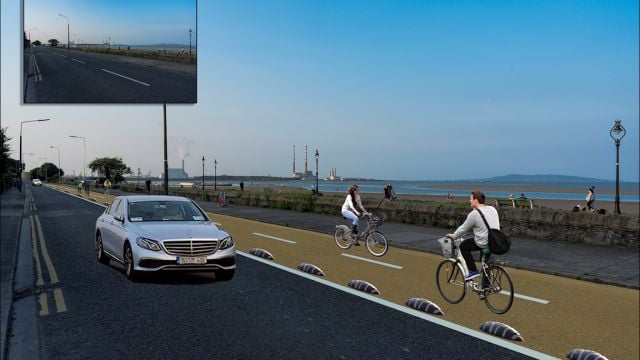Dublin City Council will have to make a fresh decision about a Sandymount cycleway trial, even if the Court of Appeal (COA) finds no flaw in the original decision, the council's lawyers have said.
Stephen Dodd SC, for the council, told the court on Tuesday that the original decision related to a “long-elapsed” six-month trial to begin on March 1st, 2021.
Any plan for a future cycleway along the Strand Road will need to be decided upon again by the council, he said.
The local authority appealed a High Court ruling in favour of local independent councillor Mannix Flynn and Sandymount resident Peter Carvill.
Mr Justice Charles Meenan ruled in July 2021 that the proposed cycleway must be subject to an Environmental Impact Assessment (EIA) and, therefore, must go through the planning process.
He made a finding that the cycleway would not, in fact, be temporary, as the council had submitted.
The Strand Road plan would have turned what is currently a two-way vehicular stretch of road along the coast into a single outbound lane with the other lane used as a two-way cycle track.
It would require the removal of a traffic island at the junction of Strand Road and Merrion Road, as well as the removal of some mini-roundabouts and the installation of bollards.
Controversial trial
Last June, after a two-day appeal hearing, the three COA judges asked for further information from the council about how it adopted the plan for the controversial trial.
The court also wanted the council to explain how a decision it took on February 25th, 2021, in relation to the cycleway was rescinded a few days later. It further asked how this was never raised before the High Court when a challenge was brought against the plan.
When the hearing resumed on Tuesday, the court was told the actual decision to adopt the trial was made on February 8th, 2021, by Brendan O’Brien, the head of the council’s technical services, environment and transportation department.
There was no written order on that date, but Mr O’Brien’s decision was widely publicised and it was conveyed to the council on February 8th, Mr Dodd said.
The decision gave a specific start date in March 2021, so it is “spent”, and any future proposal would require a new decision under section 38 of the Road Traffic Act, he added.
However, the appeal is not moot as the High Court’s findings will have “enormous implications” for the operations of a road authority, he added.
For Mr Flynn, barrister David Browne, instructed by Ken Kennedy Solicitors, said the parties involved in the case understood in the High Court that the decision being challenged was the one of February 25th.
Inconsistencies
The council’s decision to rescind the February 25th formal order was not disclosed to the High Court, he said, adding that there were “inconsistencies” that are difficult to understand from an administrative law perspective.
He asked the COA to decline to adjudicate on the appeal as, he said, it is now moot.

Mr Justice Maurice Collins, who is now a Supreme Court judge, asked how the appeal could be moot when Mr Justice Meenan made findings that will cause future planning projects like this to require planning permission. “It is an immediate obstacle to any further project of this kind,” he said.
Mr Browne said his client had not agitated for a finding in the High Court that the scheme would require planning permission and the court went further than agitated for in that regard.
The “underlying decision” is moot, he maintained, but the COA could clarify this finding about the need for planning permission if perturbed by it.
The COA, which also included now High Court President David Barniville and Ms Justice Mary Faherty, reserved its decision.







